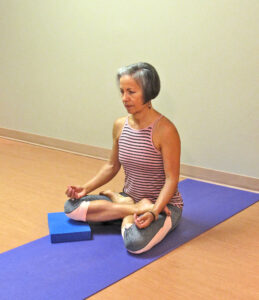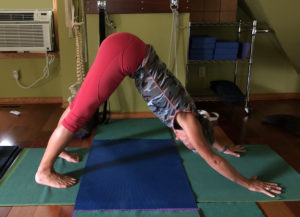The fundamental reason for the epidemic rise of anxiety and depression in our human population is because our minds are too full. We are gorging our minds with too much information and activity without the necessary rest needed for mental recouperation. Further exacerbating the dilemma is our inability to sleep for eight hours each night. Less sleep and excess mental activity are a sure formula for mental illness.
Whether your mental illness is the wandering mind found in anxiety and/or depression, deep rest is the remedy. Deep rest comes in a combination of adequate sleep as well as resting the mind from its 24/7 fight-flight reaction to the world. Our bodies and minds were not designed to be on guard every minute. No one can sustain such vigilance without paying the price of ill health.
To be able to shift into a rest-digest frame of mind, we are obliged to come to know ourself and thus to know our mind. As our awareness of ourself deepens, we recognize that our mind is not who we are but a mere collection of sensations, emotions and thoughts; reactions that may or may not have any truth. We also discover, through listening to these unconscious reactions, which have true and lasting importance to us. This gained intelligence then guides us into consciously choosing how to respond internally as well as how to take action in the world.
In essence, I described in the previous paragraph the unfolding process and product of meditation. It’s that simple. Quietly, restfully, listen to your mind every day, and you will not only discover who you aren’t but who you are as well as how you can become even more of who you want to be. That is meditation.
The PURPOSE of meditation is not to switch off the wandering mind. With a consistent meditation practice, the mind will calm and quiet. However, this is also not the purpose of meditation. Meditation provides you the opportunity to better understand your mind, which leads to less distraction from unruly thoughts.
When we are capable of focusing our mind, that is controlling ourself from distraction, we are capable of deep rest. Concentration or the ability for single-pointed focus is the bedrock of meditation. It is how we shift from fight-flight into rest-digest.
I always start my daily meditation with some form of regulated breath practice. As a result, I become more familiar with how I am breathing, which changes minute to minute, experience to experience. Our breath rhythm also alerts us to whether we are unconsciously reacting or consciously responding to what is emerging in our life.
Conduct your own science experiment and try the simple meditation below. You can meditate seated at your desk or lying down on your couch or while comfy and cosy in bed.
If you choose to lie down, it is customary to elevate the chest and head so the respiratory diaphragm does not collapse and inhibit breathing. As one example, Savasana II illustrated below accomplishes these requirements.


Both of the these Savasana II variations keep the diaphragm open. Substitute blanket rolls for bolsters or slant boards and do cover your body as it will cool down during the meditation.
Once you are settled, allow your awareness to rest on your breath’s rhythm. Stay with this until you feel you have a good sense of both your inhaled and exhaled breath.
With the thumb of one hand, block the left nostril, and INHALE-EXHALE 3 full but not forced breaths with the right nostril. Now, block the right nostril, and INHALE-EXHALE 3 times with the left nostril. For the next 3 INHALEs & EXHALEs, breathe through both nostrils. Repeat this full cycle (right, left and both nostrils) at least 3 times, or for 5 to 10 minutes, and then allow your breath to return to its natural rhythm in preparation for meditation. Notice if that rhythm is different than when you began.
You can stop here, but if you are interested in moving your awareness deeper into your inner experience, continue to watch your breath. Here is where many give up on meditation because the mind begins to send forth all kinds of sensations, emotions and/or thoughts. For many, the mind just spins out of control wandering from one topic to another. This is the natural state of an overbusy mind and body. When the mind interjects with its business (busyness), just allow that to happen without becoming attached to the story lines. In other words, be aware of the mind’s activity but don’t create a narrative around the sensations, feelings or thoughts. Just witness them and release them.
Rather than thinking of … meditating on the wandering mind, consider instead that you are meditating on the freedom of the mind. … notice how freely, creatively and naturally thoughts come into your head and how equally easily they dissipate. … just notice this freedom, and rather than getting entangled in your thoughts, give them complete freedom to rise up and fall away without any interference from you.
… what you begin to do is to meditate on the self, the witness or the consciousness, who is aware of the freedom of the mind. This self can passively and objectively notice all that happens without judging, criticizing or attempting to control it. See whether you can become the observer of the self, taking a step even further back, and really watching the deepest part of you which simply sees all that happens, but feels no need to interfere. Notice the presence and the qualities of the observer. Notice how it makes you feel to meditate on this deeper self. See whether you can tune into that inner calm and stillness. Jade Lizzie
As you may have already guessed, this is the true purpose of meditation … to come f2f with … to meet your authentic self. Now that is an exciting adventure, wouldn’t you agree?
If at first you don’t succeed, don’t despair and don’t give up. In your heart, you know the truth about yourself is contained within you. Dive deep and gather the pearly wisdom that is your birthright.




